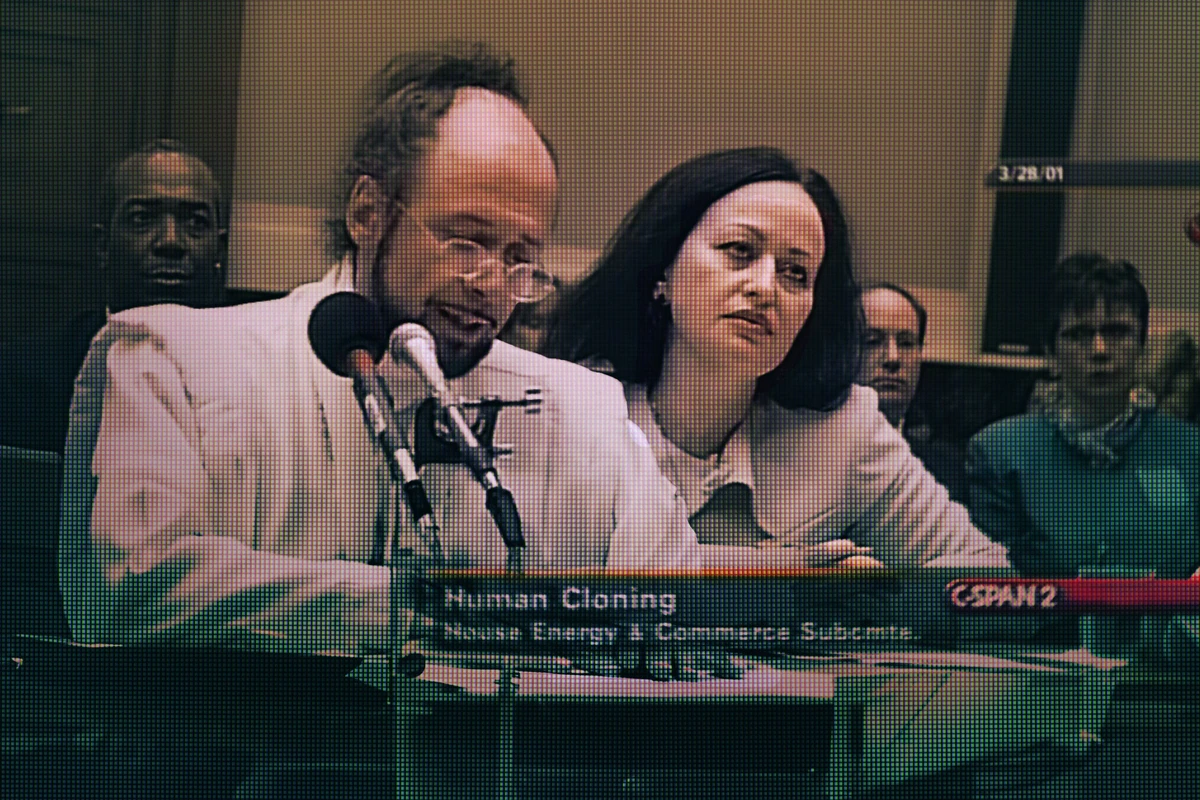Chances are you haven’t heard of Claude Vorilhon, otherwise known as Raël, but this eccentric Frenchman has attracted attention and controversy since founding the Raëlian movement in the 1970s. This unusual new religious movement combines grand claims of alien creators, promises of eternal life through cloning, and promotion of free love.
The recent Netflix docuseries Raël: The Alien Prophet dives deep into this quirky figure and his devoted followers. Through four fast-paced episodes full of wild stories, the show traces Raël’s rise from wannabe pop star to self-proclaimed prophet who built a community of believers willing to follow him anywhere.
Prepare to enter a world of supposed alien encounters, bold prophecies, naked religious ceremonies, allegations of brainwashing and abuse, and outlandish cloning experiments. Whether you end up viewing Raël as enlightened visionary, dangerous cult leader, or hilarious showman, the docuseries promises a wild ride from start to finish. Strap in for sex, scandals, spaceships, and the great quest for immortality.
Spaceships, Prophecies, and a Quest for Paradise: The Dawn of Raëlism
Our story starts in France in 1973 when an ambitious former race car driver and journalist named Claude Vorilhon had a fateful encounter. While walking in an extinct volcano in central France, Vorilhon claims a spaceship landed and an alien emerged, calling itself Yahweh.
This extraterrestrial revealed that aliens known as Elohim had created life on Earth through advanced cloning techniques. After this encounter, Vorilhon took on the name Raël and declared himself a prophet for the Elohim. He shared fantastical tales of alien abductions and paranormal adventures across media appearances and books, drawing intrigue and mockery.
But a small band of followers flocked to Raël, drawn in by his grand cosmological claims, supposed divine origins, and promises that cloning technology could grant earthly immortality. Raël taught that sexual freedom, shedding jealousy, and appreciating the wonders of the human body brought people closer to paradise on Earth.
Early converts speak of a sense of community, intellectual stimulation, and liberation from social norms. Yet behind Raël’s welcoming embrace, some spotted a hungry ego and pockets that increasingly relied on his follower’s devotion and donations. For good or ill, this was the spark that lit a global movement that would court fame and controversy across the coming decades.
Eden Rising: Sex, Submission, and Raël’s Angels
After attracting his first wave of followers, Raël sought to build a paradise on Earth for his devotees. In the early 1980s, a lush estate in Quebec called “Eden” became a retreat for daily meditation, dance parties, and shedding sexual inhibitions. Here Raël encouraged open relationships, polyamory, and shedding jealousy to reach higher planes of pleasure.
In the Netflix series, Raël followers fondly recall wild days at Eden where nude rituals and partner swapping was simply “amazing training” to unleash their true humanity. Some felt they’d finally found freedom to explore the spectrum of sexuality without shame.
But there was a transaction taking place beneath the playful hedonism—obedience and submission to Raël for access to paradise. He gathered his female followers to duties many found deeply uncomfortable, like publicly inspecting their anuses as objects of reverence. Those dubbed “angels” danced naked daily for Raël’s pleasure and joined his swelling harem.
Young and vulnerable runaways felt special when Raël first lavished them with affection and spiritual purpose, only to later share them with other men. The chosen angels learned to silence their unease and jealousy to maintain Raël’s favor. For all the talk of empowerment and pleasure, male desire and control lay at Eden’s core.
Cults, Clones and Accusations: The Troubled Side of Raëlism
Behind the free love and spaceship dreams, a darker side of control and exploitation lurked within Raël’s inner circles. Former members detail the immense pressure to recruit new followers and make large donations to afford Raël’s expensive tastes. Some devotees spent their life savings or endangered their children’s wellbeing to prove their devotion.
And as the media spotlight grew, sordid rumors spread. Young women shared chilling accounts of being “lent” to Raël’s friends as sexual playthings. His supposed “spiritual wives” lived under a cloud of jealousy and coercion veiled as enlightenment. Many felt unable to leave, having been convinced that only absolute allegiance to Raël led to paradise.
The most explosive controversy broke in the early 2000s when Raël claimed his scientists had used cloning to birth the first human baby, named Eve. This apparent breakthrough was soon exposed as a hoax, tearing the community’s credibility apart even as Raël leaned in to the infamy.
But the worst was yet to come. Investigative reporting and victim testimonies revealed a troubling pattern of Raël’s sexual relations with shockingly young devotees, some potentially underage. Allegations of child abuse and exploitation continue to follow the prophet years later.
Prophecy Goes Global: Raëlism Across Borders
As legal troubles mounted in France, Raël took his teachings on the road to evade scrutiny and find new followers. What unfolded was a bizarre game of cultural chameleon, with Raël tailoring his prophecies to sway new converts across Africa, Russia, East Asia and even Israel.
Some cynical commentators suggested Raël merely peddled existing local beliefs back to his followers, bolstering his legitimacy through cultural plagiarism. But his talent for manufacturing spiritual meaning proved effective—the Raëlian movement grew into an increasingly global community.
Raël particularly found traction in Japan where he repackaged his prophecy using Buddhist concepts for his book The True Face of God. As of today, Japan boasts the largest Raëlian population with thousands of dedicated members pushing for a controversial “embassy” where extraterrestrials can officially greet us on Judgement Day.
Yet even across borders, controversy followed. Various nations revoked the religious legal status of Raëlian outposts amidst ethical violations or illegal medical activities. But if there’s one constant of this enigmatic faith, it’s continually adapting and surviving against the odds through the magnetic pull of its prophet.
Of Prophets and Power: What Raëlism Reveals
More than just outrageous stories, the convoluted history of Raëlism sheds light on how fringe groups can exert control. The docuseries illustrates how even intelligent, independent adults can become enthralled by manufactured belief systems promising deeper meaning. It seems many are willing to override their better judgement if offered community, purpose, and especially the lure of immortality.
Raël built a hierarchy where his favor offered the only path to salvation. By positioning himself as the sole intermediary between followers and otherworldly beings, he compelled financial tribute and personal obedience. Adherents sank costs like divorce, family estrangement, and life savings to cement their commitment to the cause. And for all the open relationships, Raël horded intimate access to female devotees for himself.
The series plays out a timeless dynamic where self-interest and exploitation can be obscured by spiritual conviction. It is a call for wariness when personal struggle leads to fresh ideologies that provide all the answers. Viewers witness how otherwise ethical people justify or ignore red flags when membership offers transcendence. Ultimately Raëlism serves as a case study on the forging of false prophets who trade on the unquenchable human desire for meaning and eternity.
Lessons from the Alien Prophet
Through four bingeable episodes, Raël: The Alien Prophet proves that truth is often stranger than fiction. Raël himself comes across as a perplexing figure—at times seemingly guileless in his fantastical beliefs, at others a masterful opportunist capitalizing on humanity’s need for hope and transcendence.
Viewers are left to wrestle with fundamental questions on the nature of faith and exploitation. Why do some willingly subjugate themselves before prophets promising deeper meaning? Can benefits like community belonging and intellectual purpose ever justify compromising ethics or judgment?
While easy to dismiss the Raëlian worldview as absurdist theater, the series prompts examination of our own susceptibility to ideologies offering tidy answers. It compels us to confront how conviction, confirmation bias, and promises of paradise enable far-fetched ideas to turn exploitative. Perhaps above all, Raëlism cautions against the timeless allure of demagogues who claim exclusive communion with the divine future.
Entertaining yet unsettling, inspiring yet tragic—Raël: The Alien Prophet offers much fodder for reflection. More than just outrageous stories of spaceships and free love, it provides an insightful cautionary tale on human vulnerability and our endless quest for purpose.
The Review
Raël: The Alien Prophet
Wild, unsettling, and engrossing - Raël: The Alien Prophet proves a binge-worthy descent into the bizarre world of UFO religions. Those seeking salacious stories or reflection on human foibles will find much to marvel at across this prophetic journey marked by free love, cloning schemes, and no shortage of controversy.
PROS
- Bizarre, intriguing content
- In-depth access to Raël himself
- Compelling character study
- Archive footage visuals
- Reveals eye-opening sociological insights
- Memorable WTF moments
- Thought-provoking themes
CONS
- Uneven reenactments
- Benefits from more contextualization
- Could be organized more cohesively
- Production value varies

























